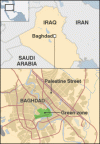Baghdad police attack 'kills 28'
A suicide bomber has killed at least 28 people queuing outside a police recruitment centre in the Iraqi capital Baghdad, police say.
This was the deadliest suicide strike in Iraq for nearly a month
At least 57 other people were wounded in the attack, carried out by a bomber on a motorcycle.
Meanwhile, the US military says it is to reduce troop numbers in the country by 12,000 in the next six months.
The level of violence in Iraq has declined since 2007, but it remains a feature of daily life for many Iraqis.
At least 12 people died two days ago when a car bomb exploded at a cattle market in Babil province.
There are still almost daily violent incidents in Baghdad.
Explosives belt
Scene where the attack took place
The attack happened at about 1000 (0700 GMT) in "the middle of a crowd outside the [police] academy on Palestine Street", a police official told AFP news agency.
Reports suggest the bomber detonated a belt of explosives as he crashed his motorbike into a line of people waiting at the side entrance to the training centre. Most of the dead were police recruits, while others were serving officers and civilians.
The reported death toll quickly rose, making this the deadliest suicide strike reported in Iraq for nearly a month.
Police recruitment centres have been a popular target for insurgents, and this academy has been attacked before.

On 1 December last year, 15 police and recruits were killed, and another 45 people injured, in twin blasts at the building. And in 2005 two female suicide bombers attacked the building, killing 40 people.
The BBC's Mike Sergeant says that measures have been taken to try to protect the building, such as setting up concrete blocks and checkpoints nearby.
But he says that with the streams of police and recruits coming and going it is difficult to make it secure.
Iraq has massively expanded its police and military forces over recent years as the government of Prime Minister Nouri Maliki seeks to ensure local forces can provide security amid the envisaged draw-down of US troops.
Troop reduction
As part of that draw-down, the US military announced on Sunday that it would not replace two brigades - comprising some 12,000 soldiers - due to leave Iraq over the next six months.
"Two brigade combat teams who were scheduled to redeploy in the next six months, along with enabling forces such as logistics, engineers and intelligence, will not be replaced," it said in a statement.
Maj Gen David Perkins
US military spokesman
Maj Gen David Perkins, a spokesman for US forces in Iraq, told a news conference that violence was at its lowest level since the summer of 2003.
He claimed a recent series of attacks was evidence that terror groups such as al-Qaeda in Iraq were growing desperate as they sought to derail security gains in the country, the Associated Press reports.
"It's indicative that al-Qaeda feels threatened," he said. "They're feeling desperate. They want very much to maintain relevance."
Some 140,000 US soldiers are currently in the country.
The withdrawal is part of President Barack Obama's plan to end the "combat mission" in Iraq by August 2010, entailing the withdrawal of some two-thirds of the US force there - some of which will be deployed in Afghanistan instead.
That reduction will in part depend on the success of national elections later this year, our correspondent says.
Between 35,000 and 50,000 American troops will then stay in Iraq for a further year, to provide support and training to Iraqi forces, the US says.



